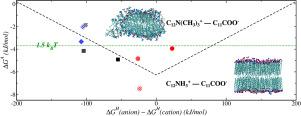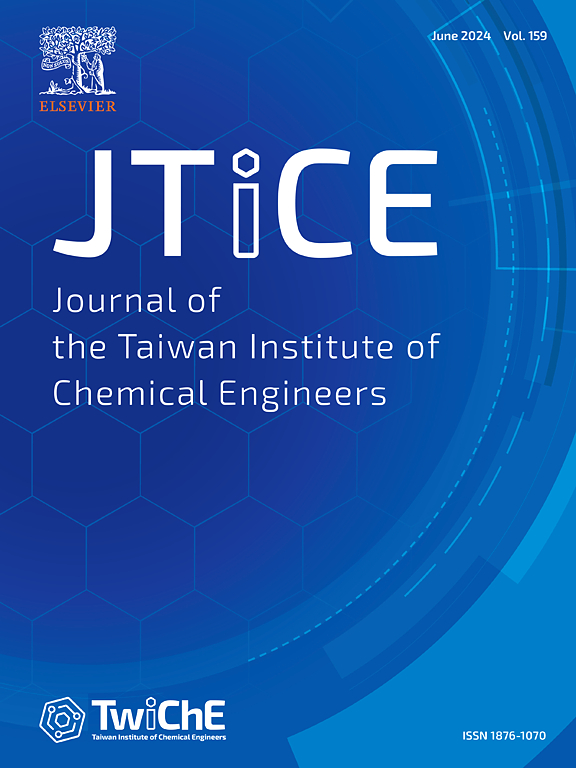通过匹配亲水性法则设计离子对两亲性仿生双层结构
IF 6.3
3区 工程技术
Q1 ENGINEERING, CHEMICAL
Journal of the Taiwan Institute of Chemical Engineers
Pub Date : 2025-10-04
DOI:10.1016/j.jtice.2025.106436
引用次数: 0
摘要
背景:离子对两亲体(IPAs)是一种多功能的仿生分子,能够自组装成双层膜,在药物输送和纳米材料设计中得到了应用。影响IPA膜稳定性的一个关键因素是离子头基之间的相互作用强度。然而,指导IPA设计的预测框架仍然有限。方法:本研究采用匹配亲水性定律(LMWA)作为热力学原理对IPA头基组合进行评价和筛选。采用分子动力学模拟和伞式采样相结合的方法计算了单个离子的水化自由能和离子对的缔合自由能。这些值被整合到一个火山图中,以确定具有平衡水合亲和力的最佳离子对。这些预测通过IPA双分子层的全原子分子动力学模拟得到了验证。重要发现:我们的研究结果表明,具有匹配水合能的离子对形成更稳定的离子配合物和坚固的双分子层。此外,从压缩模量和链序参数可以看出,具有强氢键和对称头群几何形状的体系具有更高的机械强度。相反,大的水化不匹配或各向异性头基导致胶束或交叉结构。本研究建立了一个基于lmwa的预测框架,用于合理的IPA设计,促进生物医学应用的新型囊泡系统的有效筛选。本文章由计算机程序翻译,如有差异,请以英文原文为准。

Designing ion pair amphiphiles for biomimetic bilayer formation via the Law of Matching Water Affinity
Background:
Ion pair amphiphiles (IPAs) are emerging as versatile biomimetic molecules capable of self-assembling into bilayer membranes, with applications in drug delivery and nanomaterial design. A critical factor influencing IPA membrane stability is the interaction strength between ionic headgroups. However, predictive frameworks to guide IPA design remain limited.
Methods:
In this study, we applied the Law of Matching Water Affinity (LMWA) as a thermodynamic principle to evaluate and screen IPA head group combinations. Hydration free energies of individual ions and association free energies of ion pairs were calculated using molecular dynamics simulations combined with umbrella sampling. These values were integrated into a volcano plot to identify optimal ion pairs with balanced hydration affinities. The predictions were validated through all-atom molecular dynamics simulations of IPA bilayers.
Significant Findings:
Our results reveal that ion pairs with matched hydration energies form more stable ionic complexes and robust bilayers. Additionally, systems with strong hydrogen bonding and symmetric headgroup geometries exhibited higher mechanical strength, as indicated by compressibility moduli and chain ordering parameters. Conversely, large hydration mismatches or anisotropic headgroups led to micelles or interdigitated structures. This study establishes a predictive LMWA-based framework for rational IPA design, facilitating efficient screening of novel vesicle systems for biomedical applications.
求助全文
通过发布文献求助,成功后即可免费获取论文全文。
去求助
来源期刊
CiteScore
9.10
自引率
14.00%
发文量
362
审稿时长
35 days
期刊介绍:
Journal of the Taiwan Institute of Chemical Engineers (formerly known as Journal of the Chinese Institute of Chemical Engineers) publishes original works, from fundamental principles to practical applications, in the broad field of chemical engineering with special focus on three aspects: Chemical and Biomolecular Science and Technology, Energy and Environmental Science and Technology, and Materials Science and Technology. Authors should choose for their manuscript an appropriate aspect section and a few related classifications when submitting to the journal online.

 求助内容:
求助内容: 应助结果提醒方式:
应助结果提醒方式:


